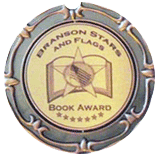



|

TRUE COLORS
 2009 Gold Medal Winner
for Historical Fiction by the Military Writers Society of America. 2009 Gold Medal Winner
for Historical Fiction by the Military Writers Society of America.
 2009 First Place winner for Historical Fiction by
the Branson Stars and Flags Book Awards.
2009 First Place winner for Historical Fiction by
the Branson Stars and Flags Book Awards.
Her war is not with enemy soldiers but with battles of the heart and of the will.
Only truth can conquer this type of foe. And truth is in short supply.
Synopsis
Cassie Golden works as a government nurse in a Federal hospital in Alexandria, Virginia.
It is there that the love, passion and conspiratorial intrigue that change her life
enter in the form of an intelligence officer, Major Michael Byron. When Michael
is offered a mission so secretive he will not even be able to contact Cassie, he
is torn between his calling and his desire to stay and begin a family with the woman
he loves. Cassie, too, must decide if she can subject her heart to his destiny.
Neither could know that kidnapping, imprisonment and murder would compound their
struggles to survive their own inner battles during the Civil War.
Excerpt
“Nurse! Cassie! Help me! I can’t see!”
I turned at the call of my name, my eyes searching the rows of Union wounded before settling on the terror-stricken young corporal. I raced to his side, slipped my fingers under his hands and drew them away from his badly burned and contused face. His sightless eyes, scarred over from the close blast of a Mississippi musket fired in haste, explored the darkness for me.
“I’m here, Corporal Townsend.”
He found my shoulders and gripped them. I could verily feel the terror in them.
“Cassie, I can’t see! Oh, God, help me!”
His hands returned to his face, his fingertips daring to dab the still raw area around his eyes. I took hold of his hands again.
“You know the doctor said those bandages should not be removed for at least another week.” My words came more harshly than I meant for them to, my anxiety over his condition having taken the form of a reprimand.
From whence came the source of the strength it took for him to wring free from my grip I did not know. He grappled in panic with me and Tess Dupre, the other nurse on duty that evening in our Alexandria, Virginia hospital ward as we tried to lay him back down. In the two months since I had left Pennsylvania to work as a government nurse, such wrestling matches had become commonplace.
Enlisting the aid of an orderly and a couple of patients, we managed to get a sedative down him. Once its effect calmed him, I placed a clean set of eye patches, rewrapped gauze around his head to keep them in place, and applied salve to the other burned areas on his face. I then turned my attention to redressing his flank wound where a Reb bayonet had stopped just shy of the left kidney. A green malodorous purulence exuded from the cavity in his side along with blood and serum, repelling my nostrils. I knew it would not be long before the infection claimed him.
At last he fell into a restless sleep as I stood at his bedside holding his hand. Only now, with the urgency and arduous strain of the past half hour behind me, could I consider the fright and the soul-felt pain in those hands that had grasped my shoulders in a plea for help. Only now were there tears to put under restraint. Only now could I grieve for him.
That feeling returned then, the one from deep within that questioned whether I could continue this work much longer. I felt it more often, and ever stronger, until it was nearly as powerful as had been the calling to come and care for these champions of mine.
This federal hospital where my life had merged with theirs was in fact a hotel that had been appropriated by the government and turned into an infirmary. This particular ward had replaced the formal dining room. The menu now consisted of quinine, opium, calomel, mercurial ointments and the like. The clientele now was made up of patients whose bodies bore the scars and wounds of an exceptionally violent and bloody battle.
The next several hours went by in my usual routine: changing linens, administering painkillers, painting wounds with iodine, and aiding Colonel Borman,
our chief surgeon, in changing dressings and bleeding patients whose lungs were filling with fluid. In the spare moments between procedures I rolled bandages, rinsed off bloody instruments with chlorine water then laid them out to air dry for their next use, and applied cool compresses to some of the feverish patients. And there was the task of diligently maintaining medical records on each patient since the government’s pension system relied upon accurate documentation. By eleven o’clock that evening, an hour before the end of my shift, the effects of another strenuous day were taking their toll.
Approaching a sleeping infantryman who had sustained a fractured femur, I rubbed my hands together to warm them before gently touching his foot to assess his circulation. The skin was warm, the pulses strong. He was one of the fortunate ones. A healing wound, good circulation, no sign of infection.
I delicately pulled the blanket up to his chest. He jolted awake, came part way off the cot, and snatched both of my wrists in a strangling grip.
“It’s all right, Sergeant Levitt. It’s me. Cassie. You’re in a hospital, remember? It’s all right now.”
His wide eyes cast in all directions around the dim hall before settling on me.
“It’s all right. You’re safe here.”
His deep, erratic breathing began to slow; the muscles in his torso relaxed.
“Uh, Levitt, could you…” I nodded toward the powerful hands that still clutched my now numbing wrists.
He released me and sunk back on his mattress.
“I’m so sorry, Miss Cassie. I just…”
“It’s my own fault for startling you. I should know better by now.”
As I rose and turned he again grabbed my wrist. “Wait, please, Miss Cassie. There’s something I need to ask of you.”
Trying to dispel his ongoing disquietude, I asked, “You’re not going to propose to me, too, are you, Levitt?”
He smiled and relaxed a bit more. “The thought had crossed my mind. You certainly are a lovely sight on eyes that have seen the devil himself.” His voice lowered. “But Cassie, I need a tremendous favor. Believe me, I wouldn’t ask this of just anyone, and wouldn’t ask at all if it wasn’t so important.”
“What is it?”
“Among the belongings I brought here is a book, a red leather-bound book with gold lettering on the cover.”
“We lock up all such personal effects in a storeroom at the end of the ward. You’ve no need to worry.”
“You know that room isn’t very secure. Please, Cassie.” He pulled me closer. “Get that book out of there!”
* * *
 Come join The True Colors community on facebook.
Come join The True Colors community on facebook.
|




